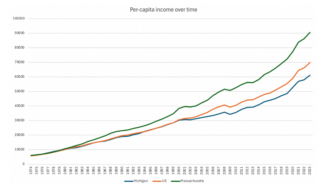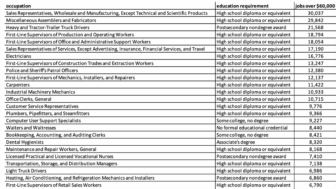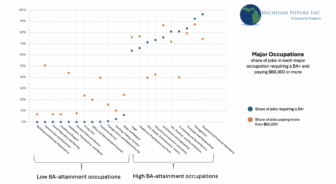
As we have explored in our lessons from a pandemic-driven economy posts (here and here) what the multitude of low-wage workers need most is cash. Everyday in every Michigan community we see the vast number of low-wage workers––some still working, many who have lost their job––who are struggling to make ends meet.
You now don’t need data to make the case that structurally the Michigan economy has too many of us working in low-wage jobs. Many without health coverage and almost none with paid leave. And because these low-wage workers are struggling to just pay the bills for necessities, most have little or no savings.
That reality should now make clear to all of us that a vast majority of those struggling economically and without any safety net to deal with emergencies are hard working Michiganders. Who like us get up every day and work hard to earn a living. That the prime reason for so many struggling is not irresponsible adults coddled by a too-generous public safety net, but rather an economy that even when it is booming has too few jobs that pay family-sustaining wages and provides health coverage and paid leave.
In a Niskanen Center essay, entitled A Social Safety Net for an Age of Uncertainty, Ed Dolan makes the case for a cash-based social safety net and explores what such a system might look like. Dolan writes:
The COVID-19 pandemic is turning out to be a wake-up call, not just for public health, but for economic security, as well. We are learning that any one of us can be knocked off the ladder of prosperity at any time, no matter what rung we are on today
What is more, COVID-19 is by no means the last crisis we are likely to face. Just a few things that may be coming down the pike: A really bad virus, one as contagious as measles and as deadly as Ebola; floods, wildfires, droughts, and famines brought on by climate change; a job apocalypse, in which entire middle-class occupations disappear one by one.
Meanwhile, none of the old risks are going away. The risk of being born poor, making even the first step to self-sufficiency precarious. The risk of being born with a disability or congenital illness. The risks of bad choices — dropping out of school; falling into crime; falling into substance abuse.
This crisis has shown everyone, left, right, or center, just how inadequate our fragmented social safety net is for dealing with what the world is throwing at us. Encouragingly, the first response has been a sound one: Send money, and send it fast. To think how radical the idea of universal cash assistance seemed, oh such a short time ago.
Dolan recommends adopting what he calls integrated cash assistance which would include:
- A basic grant that would be paid to all eligible adults, regardless of their employment status, supplemented by a universal child allowance that would not depend on the employment status or earnings of parents.
- A wage subsidy that would provide a bonus for each dollar of earned income to low-wage workers, up to a maximum benefit. The subsidy would be the same for all workers, regardless of family status.
- A phaseout that would reduce the combined basic grant and wage subsidy at a moderate rate, beginning at a high enough level that all families and unattached individuals would be guaranteed a reasonable degree of income security.
Urban Institute Fellow Leonard E. Burman proposes providing cash through what he calls a Universal Earned Income Tax Credit: a wage tax credit of 100 percent of earnings up to a maximum credit of $10,000. He too would also provide an expanded refundable child tax credit.
Prior to the onset of the pandemic, California enacted an annual one billion dollar increase in their EITC which includes an additional payment for households with children under six.
Clearly there are variety of ways to design a cash-based safety net and to pay for it. Dolan would pay for his proposal with eliminating most non- health coverage safety net programs. Burman would raise taxes.
The details should be up for debate. What should not be is whether we need a greatly expanded cash-based safety net. It should be now crystal clear that the prime economic challenge of our times is having an economy that provides family-sustaining jobs––not just any job––so that all working Michigan households can raise a family and pass on a better opportunity to their children. And to achieve that we, first and foremost, need a generous cash-based safety net.







